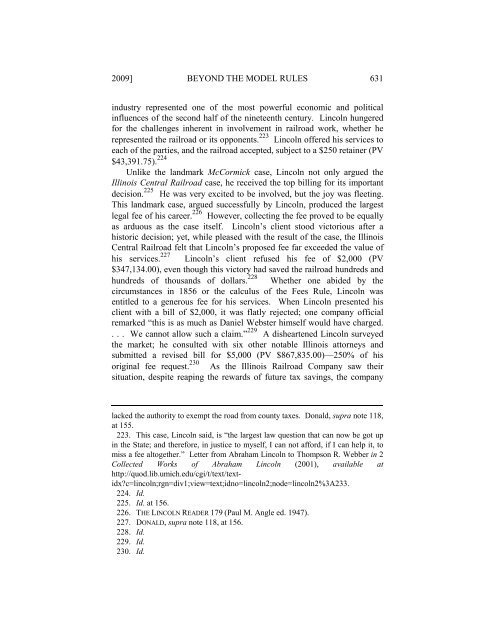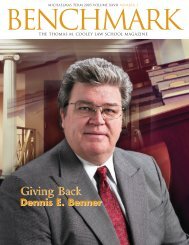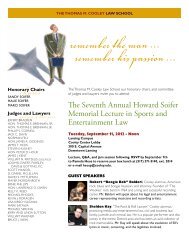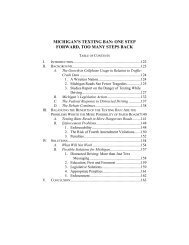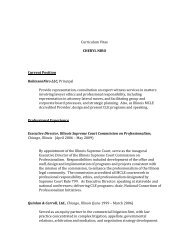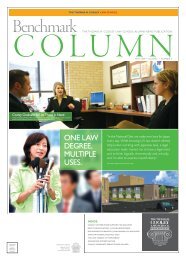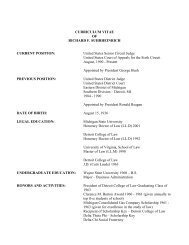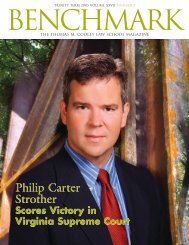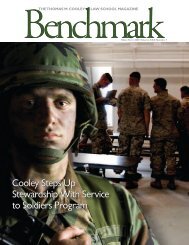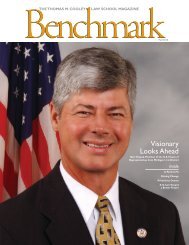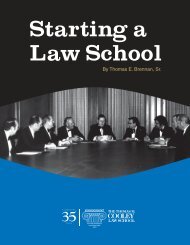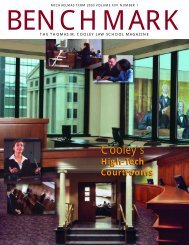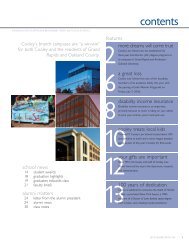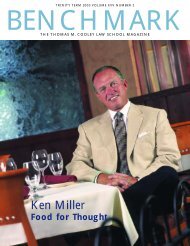Beyond The Model Rules - Thomas M. Cooley Law School
Beyond The Model Rules - Thomas M. Cooley Law School
Beyond The Model Rules - Thomas M. Cooley Law School
You also want an ePaper? Increase the reach of your titles
YUMPU automatically turns print PDFs into web optimized ePapers that Google loves.
2009] BEYOND THE MODEL RULES 631industry represented one of the most powerful economic and politicalinfluences of the second half of the nineteenth century. Lincoln hungeredfor the challenges inherent in involvement in railroad work, whether herepresented the railroad or its opponents. 223 Lincoln offered his services toeach of the parties, and the railroad accepted, subject to a $250 retainer (PV$43,391.75). 224Unlike the landmark McCormick case, Lincoln not only argued theIllinois Central Railroad case, he received the top billing for its importantdecision. 225 He was very excited to be involved, but the joy was fleeting.This landmark case, argued successfully by Lincoln, produced the largestlegal fee of his career. 226 However, collecting the fee proved to be equallyas arduous as the case itself. Lincoln’s client stood victorious after ahistoric decision; yet, while pleased with the result of the case, the IllinoisCentral Railroad felt that Lincoln’s proposed fee far exceeded the value ofhis services. 227 Lincoln’s client refused his fee of $2,000 (PV$347,134.00), even though this victory had saved the railroad hundreds andhundreds of thousands of dollars. 228 Whether one abided by thecircumstances in 1856 or the calculus of the Fees Rule, Lincoln wasentitled to a generous fee for his services. When Lincoln presented hisclient with a bill of $2,000, it was flatly rejected; one company officialremarked “this is as much as Daniel Webster himself would have charged.. . . We cannot allow such a claim.” 229 A disheartened Lincoln surveyedthe market; he consulted with six other notable Illinois attorneys andsubmitted a revised bill for $5,000 (PV $867,835.00)—250% of hisoriginal fee request. 230 As the Illinois Railroad Company saw theirsituation, despite reaping the rewards of future tax savings, the companylacked the authority to exempt the road from county taxes. Donald, supra note 118,at 155.223. This case, Lincoln said, is “the largest law question that can now be got upin the State; and therefore, in justice to myself, I can not afford, if I can help it, tomiss a fee altogether.” Letter from Abraham Lincoln to Thompson R. Webber in 2Collected Works of Abraham Lincoln (2001), available athttp://quod.lib.umich.edu/cgi/t/text/textidx?c=lincoln;rgn=div1;view=text;idno=lincoln2;node=lincoln2%3A233.224. Id.225. Id. at 156.226. THE LINCOLN READER 179 (Paul M. Angle ed. 1947).227. DONALD, supra note 118, at 156.228. Id.229. Id.230. Id.


